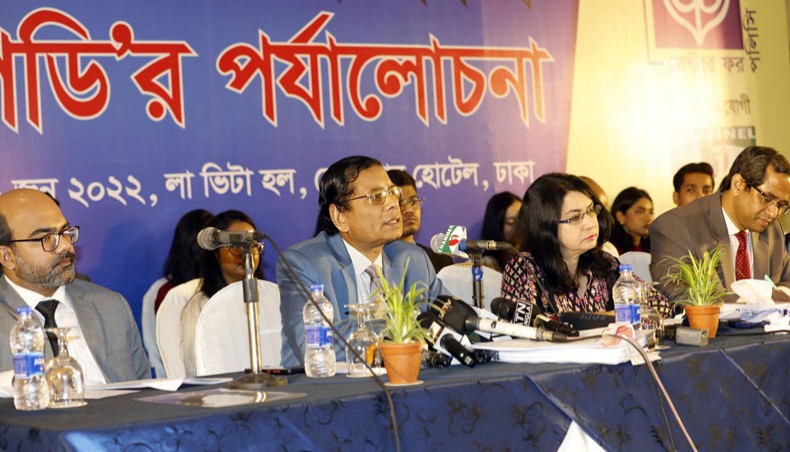Staff Correspondent | Jun 10,2022 | New Age Bangladesh
Centre for Policy Dialogue distinguished fellow Dr Mustafizur Rahman speaks at a press briefing on the proposed national budget at a hotel in the capital on Friday. — New Age photo
The Centre for Policy Dialogue on Friday slammed the government’s new budgetary initiative to allow the legalisation of laundered money abroad.
The FY23 budget, the CPD said, is also pro-rich and not supportive of the interest of the low-income people who are struggling hard to cope with the high inflation.
The think tank came up with the observations at a briefing on the proposed national budget for 2022–23 at a city hotel, citing that the illegal-money legalisation move is extremely immoral and it would encourage money laundering from Bangladesh more.
The government in the proposed FY23 budget has proposed to allow Bangladeshis to legalise their assets overseas by paying taxes on the possessions without facing any questions.
According to the budget proposal, ‘No authority, including the income tax authority, shall raise any question as to the source of any assets located abroad if a taxpayer pays tax on such assets.’
The government has proposed a 15 per cent tax of the fair market value of any immovable assets located outside Bangladesh without repatriation to the country, a 10 per cent tax on any moveable assets not repatriated to the country and a 7 per cent tax on cash and cash-equivalent assets repatriated to the country.
CPD executive director Fahmida Khatun observed that the scope for legalising laundered money would never bring any revenue for the government.
The launderers have siphoned the money off the country not to bring it back as it would entail some risk factors as well, she said.
‘It would also demoralise other people who regularly pay taxes,’ she further observed.
CPD distinguished fellow Mustafizur Rahman said that the move to facilitate legalising laundered money was ethically, economically and politically unacceptable.
Instead of bringing back the laundered money, the government’s policy to legalise laundered money would fuel the tendency to siphon money off the country.
While the regular individual and corporate taxpayers are required to pay taxes at the rate of 25 per cent and 42 per cent respectively, the government has allowed legalising laundered money by paying taxes at the rate of 7–15 per cent, he reminded.
‘Even though the scope has been proposed for FY23 only, the measure may give an indication to the launderers that the government would occasionally provide such an opportunity,’ said Mustafizur.
Mustafizur further said that the proposed taxation measures would benefit the rich but not the low- and middle-income people who are going through a very hard time amid the price spiral.
Considering the growing rich-poor inequality, the government should have slapped higher taxes on the rich while giving benefit to the poor.
All in all, the CPD distinguished fellow said, the budget lacks creativity and sensitivity.
About the discrimination between the high-income people and the low- and middle-income people, Fahmida said that the tax-free income limit was kept unchanged at Tk 3 lakh in the new budget.
‘We had earlier proposed that the tax-free income ceiling should be set at Tk 3.5 lakh to give the low-income and middle-class people some respite amid the high inflation,’ she pointed out.
But, she resented, the proposal was ignored.
‘On the other hand, the applicable tax rate on the high income people should have been reset at 30 per cent, as it was applicable earlier, so that the government can source higher revenue and spend the same for the marginal people,’ the CPD executive director said.
The tax-free ceiling for allowances, another issue of the high-income people and not an issue of the poor people, has been revised upward to Tk 10 lakh for FY23 from Tk 5 lakh in FY22, Fahmida further despaired.
Besides, the reduction in corporate taxes in the name of job creation and attracting investments will benefit the businesses, she said, adding that the move will hardly bring any immediate benefit for the poor people.
The 29 essential commodities directly consumed by the common people, she also said, are subject to high taxes in the import stage.
‘The taxes on those goods were expected to be reduced, but it was left mostly unaddressed,’ she said.
She noted that the reduction in taxes on sugar, puffed rice and power tillers, among others, would give respite to the common people to some extent.
Fahmida urged the government to take measures to reform the tax collection system so that taxes can be collected instantly by using advanced technologies.
She also slammed the government for its proposal to reduce the allocation for the open market sale of essential goods.
‘I don’t understand why such a move was taken,’ she said.
Raising a question about treating the pension spending as the government’s social safety spending, she said that the allocation for social safety has been reduced to some extent.
The CPD urged the government to reduce the taxes on the essential commodities, give the middle- and low-income people respite from the existing tax burden, provide subsidy to keep the gas and electricity prices under control and expand the social safety net amid the global price spiral.
The finance minister has, CPD research director Khondaker Golam Moazzem said, identified in the proposed budget six challenges for the country’s economy, including inflation, investment, project implementation, VAT collection and exchange rate.
But the budget lacks measures to address them, Golam Moazzem said.

